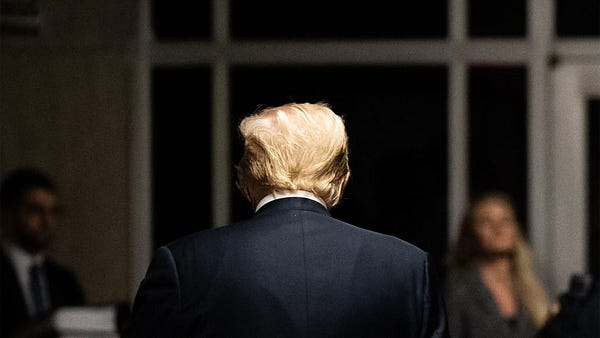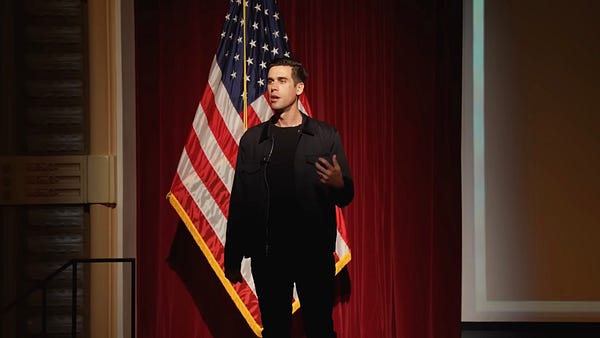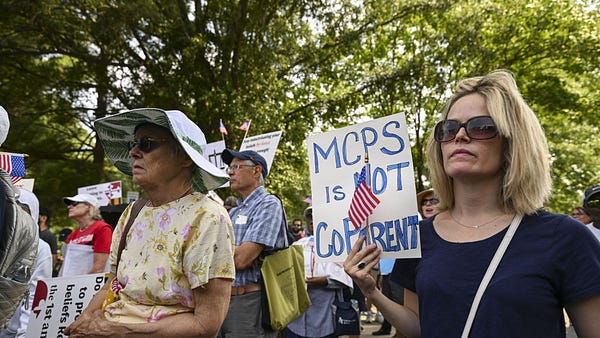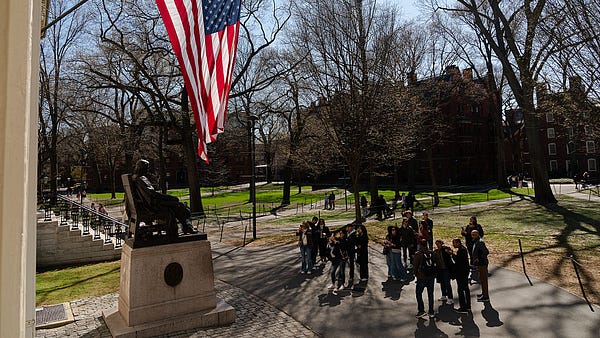
The Free Press

Today from The Free Press: The first episode of our Israel audio documentary; how to attend our next debate; why Dune: Part Two won’t save Hollywood; and ten stories we’re reading.
But first, another scoop from Free Press reporter Francesca Block. (Or “Frannie Blockbuster,” as we now refer to her at TFP HQ.)
An activist group in California has paid public high schoolers $1,400 each to learn how to fight for social and racial justice. And the money for the scheme comes from the state’s taxpayers.
Californians for Justice, which promotes itself as a “statewide youth-powered organization fighting for racial justice,” struck a deal with the Long Beach Unified School District to run after-school clubs that train teenagers in the way of the social justice warrior. Exactly what the kids learn in the sessions isn’t clear, but one teenage participant was refreshingly honest in explaining why other kids should sign up: “You get paid good.”
Teachers and parents interviewed by The Free Press call the scheme a “horrible propaganda strategy.”
One teacher in the district told Francesca that a scheme designed to help children find their voice is having the opposite effect. “One of the reasons that they were hired is to help our students find their voice and be able to express it,” said Jay Goldfischer, a high school history teacher. “But in reality, CFJ is not helping students find their own voices. It’s giving them a scripted voice that’s not their own.”
“They’re teaching them parroting,” he added, “which is the exact opposite of how you empower children.”
Read Francesca’s full investigation here:
Come to Our Next Live Debate!
Ah, presidential debates. A crucial pillar of our democracy. A chance for Americans to hear soaring rhetoric from the people vying to lead this country and the free world on the issues that matter. . .
If only! Yes, if you couldn’t tell from my tone, we at The Free Press think presidential debates have become a bit of a joke. Which is why—in case you missed our announcement yesterday—we’re doing some counterprogramming of our own with a new series of live events: The America Debates.
We’re kicking things off in Dallas on April 11, where the question up for discussion will be: Should America Shut Its Borders?
Ann Coulter and Sohrab Ahmari will face off against Nick Gillespie and Cenk Uygur, with Bari moderating. You won’t want to miss it. (Did we mention there’s an after-party?)
The presale is open to paid subscribers now (for details on how to get early access, click here) and tickets will go on sale for everyone else at 11 a.m. ET today. Get ’em while they’re hot!
Ten Stories We’re Reading
The White House is betting on bad polls. Nate Silver thinks that’s risky. (Silver Bulletin)
Mitch McConnell has endorsed Donald Trump. (CNN)
Nikki Haley has not. (AP)
A movie about a fictional civil war has some worried about an actual civil war—which is presumably the whole point. (Hollywood Reporter)
After reports of a meeting with Donald Trump, Elon Musk says he is not donating to “either candidate for U.S. president.” (X)
Just 27 percent of Americans think the country is as respected throughout the world as it was three years ago. Remember “America is back”? (Gallup)
But Pax Americana is more robust than it looks, argues Walter Russell Mead. (WSJ)
New York governor Kathy Hochul plans to deploy the National Guard on New York’s subway system to check bags and patrol platforms. Or, as Tom Cotton put it on X, “send[ing] in the troops to restore law and order.” (NYT)
Brown will reinstate standardized testing. It is the third Ivy, joining Dartmouth and Yale, to have done so this year. Six months from now, the rest will have signed on and the whole thing will be memory-holed like the rest of 2020. (Brown Daily Herald)
A UK court is weighing a juicy question: Who created crypto? (Axios)
Listen: Episode One of Our New Audio Documentary on Israel at War Is Out Now
Earlier this week, Honestly executive producer Candace Mittel Kahn wrote about why she, Bari, and a whole team from The Free Press went to Israel earlier this year.
“Months after Hamas invaded the country,” Candace wrote, “I knew that Israel was gone. What I would find in its place, I didn’t know. But I went. I went because I wanted to know.”
As Candace went on to explain, she arrived back home from that trip with 30 hours of tape. “I got to work putting together the story of a people in mourning, a country at war, and a nation on the frontlines of a civilizational fight.”
The first chapter in that story, “Running Toward Fire,” is out today.
Click here to listen:
Can Dune: Part Two Save Hollywood?
Hollywood is in trouble. Yes, Barbie and Oppenheimer brought in record profits, and a wave of industrial action in Tinseltown has finally passed. But streaming, AI, dwindling attention spans, and aging stars mean movie execs are nervous. Enter Dune: Part Two, which opened Friday—the film many executives hope will put their industry back in business. The sci-fi blockbuster delivered in its opening weekend, bringing in $81.5 million at the box office. But does the movie itself live up to the hype? And is Timothée Chalamet really the next Tom Cruise? We sent Suzy Weiss out to Arrakis (okay, a theater in Brooklyn), to investigate. Here’s her verdict:
Dune: Part Two is a feast for the eyes. The special effects are amazing, the shots are majestic, but a launching pad for New Hollywood it is not. Let me explain why.
The sequel sees the hero, Paul Atriedes, played by Timothée Chalamet, battle alongside—and win the respect of—the Fremen, an indigenous desert people. Zendaya, a Fremen, plays Chani, the reluctant, then devoted, love interest. And a third young star, Austin Butler, is the murderous, psychopathic, and “sexually vulnerable” villain prince, Feyd-Rautha.
These three A-listers—Butler, who exploded onto the scene in Baz Luhrmann’s Elvis, Chalamet, and Zendaya—are meant to replace Studio City’s aging fleet: Cruise, Kidman, Pitt, DiCaprio. All three young stars are the subject of breathless coverage, for their critically acclaimed acting, carefully appointed outfits, and relationships with other stars. Each is the face of a luxury perfume. All three of them have appeared on the Disney Channel.
And it shows.
They are all clean and corporatized. Brand safe. There’s barely anything to hold on to with these young actors, which makes the experience of watching them less exciting. There’s no promise of an on-screen romance tearing up a real-life marriage (looking at you, Mr. and Mrs. Smith). I can’t imagine any of them jumping up and down on Oprah’s couch, or even sharing an outlandish political opinion, let alone anything having to do with a gerbil.
Studio City has been shoving Timothée Chalamet down our throats as everyone from Willy Wonka to King Henry V to, soon, Bob Dylan. God help us. Chalamet was well-cast in Call Me by Your Name and Ladybird, movies where he plays an affected teen, but Dylan? Henry V? He’s going to have to show us some real-life verve to be believable in the heavier roles.
In Dune, predictably, Chalamet’s Paul is pretty, but he’s not fearsome. Feyd-Rautha is a young Voldemort, if you’re into that sort of thing. Chalamet and Zendaya’s boyish bodies look oddly similar. I had fun at the movie, but I felt like I was watching action figures hit their marks, not a new crop of shiny young things steering the movie industry out of choppy waters.
Oliver Wiseman is a writer and editor at The Free Press. Follow him on X @ollywiseman.
And become a Free Press subscriber today:





















I just can't see Chalamet being the next big male movie star. He's too pretty, looks like he weighs 130 pounds. He's the guy who is hitting on your girlfriend while she attends a poetry workshop.
But in this new world of crushing the patriarchy and toxic masculinity, maybe he is the ideal of Hollywood's Leading Man.
The days of Gary Cooper, Clint Eastwood, Tom Cruise and Brad Pitt are coming to an end.
The biggest thing I've learned best from the comments on this site is that modern adult right-wingers talk exactly like left-wing teenage boys.
This is especially true of a tiny handful of extremely verbose right-wingers here, who seem to consider themselves owners of this forum and this conversation conducted in their own living rooms, where everyone is by default expected to bow to their domineering opinions.
Yeah, we get it. You think you know everything about everything--even the side of the political aisle to which you've never belonged. And you use insults and vitriol against people you don't know and would never show the courtesy of listening to.
Welcome to adolescence.
The only difference between you (and you know who you are) and the left is that you're not teenagers. You're not even twenty-somethings. You're old enough to know better than to behave this way toward complete strangers. Supposedly.
My grandparents were hardcore Nixon and Reagan Republicans. My parents and I were hardcore Carter and Clinton Democrats. (And none of us could stand Bush Jr.) Yet, from the time I was a teenage girl in the 1970s, I was able to talk politics with my grandparents, with mutual respect and consideration.
All I had to do was treat them as though they shared my values of being good people and taking care of everyone in our society. I listened to them. I spoke reasonably to them. I didn't take offense, even when they said offensive things. (And they reflexively said offensive things about the left, although my parents didn't talk that way about the right.) I never, ever, ever said anything offensive back. I kept my sense of humor and my desire to get along as my touchstone.
So time and time again, we agreed on our values. And we brainstormed reasonable ways to enact them in government. We had wonderful conversations. And time and time again, my grandparents eventually said they were beginning to understand the left in ways that my parents swore they never would.
Because I--just a teenage girl--held the line at respect and consideration.
So I sure would like to see some of that respect and consideration from the right-wingers here in these comments. I don't come here to see grown adults behave like teenage boys.
I come here to understand what's happening to our world and talk to reasonable people about what we can do to fix it.